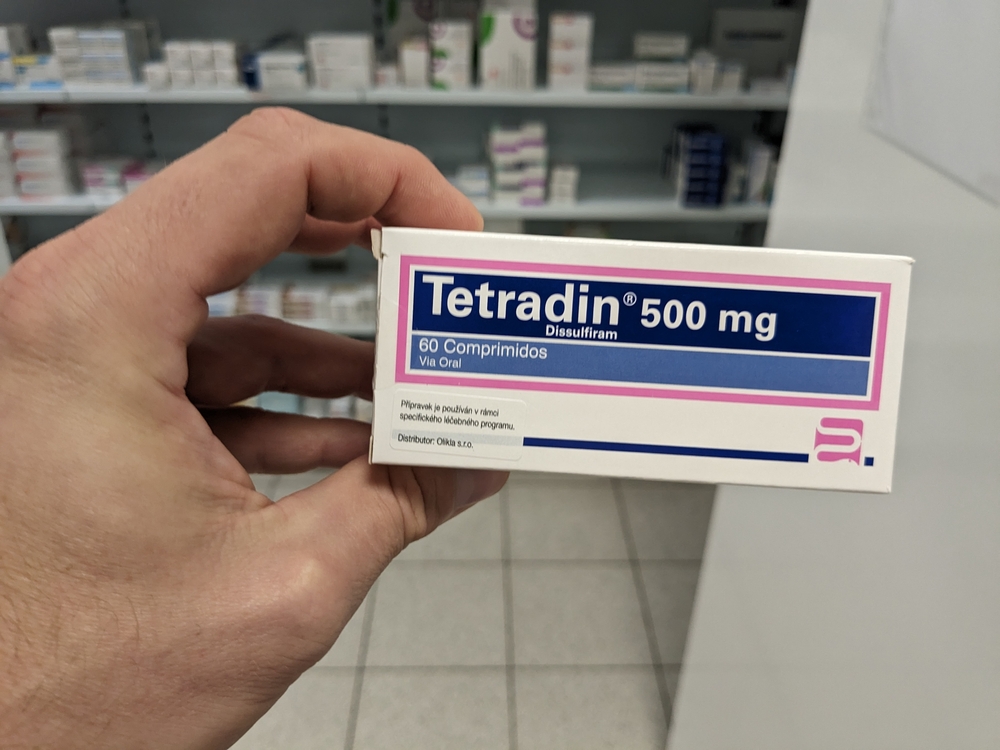Last Updated:
July 21st, 2025
Taking Disulfiram as Part of the Detox Process
Disulfiram provides an inventive approach to curbing alcohol relapse by making the consumption of alcohol physically unpleasant. Alcohol use disorder affects millions of people in Britain, and relapse rates among those in recovery are high. Unlike other forms of detox medication, Disulfiram doesn’t ease withdrawal symptoms; it produces unpleasant ones, which make drinking a horrible experience. While this can be an effective preventative measure, Disulfiram may not be the right choice for everyone so it is important to understand its effects, side effects and potential drug interactions.

What is Disulfiram?
Disulfiram detox medication is designed as an aversion therapy, used to tackle alcoholic addiction by making consumption physically repelling. This is completely different to other forms of medication typically used in detox which usually reduce cravings or make withdrawal easier. Instead, Disulfiram makes the prospect of relapse unappealing and the actual experience of relapse one which the person doesn’t want to repeat.
The deterrent effects of Disulfiram on alcohol consumption were serendipitously discovered in the 1940s when it was being studied for different uses. Researchers noted that workers handling similar compounds in the rubber industry suffered unpleasant reactions after drinking. This incidental finding prompted further studies, ultimately confirming that Disulfiram could effectively induce negative reactions to alcohol and could be used in treatment for alcoholism.
In 1951, Disulfiram detox medication was approved in the US for the treatment of alcohol addiction and has since been distributed globally under its brand name Antabuse. It is usually given as disulfiram tablets and is typically prescribed to patients who have already stopped drinking and are dedicated to staying sober. Individual disulfiram dosage and how long treatment lasts are tailored to meet the unique requirements of each patient, with strict medical supervision to ensure safety and efficacy.
Disulfiram tablet uses are also being explored for other conditions, including latent HIV, some cancers, parasitic infections and anxiety.
Why does the disulfiram reaction occur?
Disulfiram disrupts the body’s ability to process alcohol by targeting the enzyme responsible for its metabolism. Normally, alcohol is converted into acetaldehyde, which is then transformed into acetic acid by the enzyme aldehyde dehydrogenase.
Disulfiram detox medication blocks this enzyme, causing acetaldehyde to build up in the bloodstream when alcohol is consumed, leading to immediate and unpleasant reactions that discourage further drinking. A typical disulfiram reaction may involve:
These effects can come on within just ten minutes of consuming alcohol but can continue for several hours depending on how much alcohol and Disulfiram have been consumed. Disulfiram tablets need to be taken every day for it to be effective but it can be a huge help in preventing relapse, particularly in those who have already made significant recovery progress.
However, disulfiram detox medication is most effective as one part of a holistic alcohol rehab programme. This will usually involve medical detox, therapies, holistic treatments and aftercare. This comprehensive treatment plan allows Disulfiram to act as a relapse deterrent while the physical, mental and emotional triggers of alcohol addiction are resolved.
What are some potential disulfiram side effects?
When we talk about “side effects”, we usually mean unpleasant or potentially harmful reactions to a drug. However, as a disulfiram reaction is intentionally unpleasant, side effects may be more difficult to spot. To help ensure the safe use of the medication, here are some common disulfiram side effects that patients and healthcare providers should look out for:
- Acne and skin rashes
- Lingering low-grade headaches
- Fatigue and drowsiness
- Garlicky or metallic aftertaste
- Minor elevations in liver enzymes
While these are generally harmless, some other side effects of Disulfiram can be potentially harmful. Some of the most serious include:
- Liver issues – These often appear as symptoms like jaundice, extreme fatigue and unusual changes in urine or stool colour. If you spot any of these disulfiram side effects, you should get regular liver function tests, especially if you have existing liver conditions.
- Severe neurological symptoms – These include confusion, visual disturbances and seizures.
- Serious allergic reactions – These can cause difficulty breathing, hives and swelling of the tongue, throat, lips or face.

To ensure safety while using Disulfiram, it must be managed by a medical professional who fully understands the patient’s medical background and current health. Patients must also be transparent about their alcohol usage and any other substances they are taking and report any disulfiram side effects immediately to avoid serious complications.
Notable disulfiram drug interactions
The unique way Disulfiram works in the body can cause it to interact with various medications and other substances. These interactions can lead to enhanced effects, reduced effectiveness or increased side effects of other drugs. For anyone prescribed Disulfiram, understanding these interactions is critical to maintaining effective treatment and ensuring personal safety. Some of the most notable disulfiram drug interactions include:
Contact us today to learn more about Disulfiram and the detox process
Battling alcohol addiction can seem like an impossible challenge, but you don’t have to face it alone. At Addiction Helper, we are here to answer any detox questions and help you find a rehab programme that fits your situation. Get in touch with us for expert advice and start your journey to alcohol recovery today.
Our compassionate team are ready and available to take your call, and guide you towards lasting the lasting addiction recovery you deserve.
Frequently Asked Questions
(Click here to see works cited)
- Durrani, Mateen. “Disulfiram | Disulfiram for detox treatment | UKAT.” UK Addiction Treatment Centres, 8 August 2023, https://www.ukat.co.uk/detox/medication/disulfiram/. Accessed 14 March 2025.
- DrugBank. “Disulfiram: Uses, Interactions, Mechanism of Action.” DrugBank, 13 June 2005, https://go.drugbank.com/drugs/DB00822. Accessed 14 March 2025.
- Stokes, Maranda, and Sara Abdijadid. “Disulfiram – StatPearls.” NCBI, https://www.ncbi.nlm.nih.gov/books/NBK459340/. Accessed 14 March 2025.
- MedlinePlus. “Disulfiram.” MedlinePlus, 15 August 2017, https://medlineplus.gov/druginfo/meds/a682602.html. Accessed 14 March 2025.

